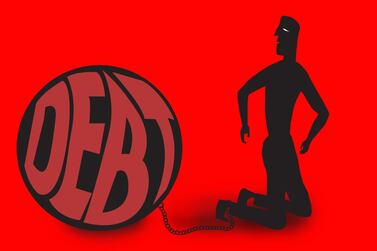I have maxed out four credit cards, going over the limit on all of them. I owe over Dh175,000 with Dh53,700 of that just on credit cards because I have been unable to make the last two monthly repayments on the cards. On top of this I have a loan I signed up for a year ago, which I have not missed any repayments on. My debts are:
Personal loan: Dh121,871 (monthly payment of Dh3,481)
Credit card 1: Dh35,000 (over limit by Dh5,000)
Credit card 2: Dh6,000 (over limit by Dh1,000)
Credit card 3: Dh6,200 (over limit by Dh1,200)
Credit card 4: Dh6,500 (over limit by Dh1,500)
Total debt: Dh175,571
I have told the banks I cannot meet my card payments and that I would prefer to pay fixed amounts each month but they have asked me to clear the overdue amount first before they will negotiate.
I built up the debts on personal expenses, particularly medical bills for infertility treatment that my wife and I are dealing with. I then signed up for the loan to pay off the credit cards and I closed two of the cards. However, I had to use the cards again for routine daily expenses. Because I was only paying the minimum amount on the cards, the outstanding amount remained the same.
My salary as a sales executive is Dh8,250. Once the loan instalment is paid, I am left with Dh4,770. We pay our regular bills, such as utilities and internet, with the credit cards.
I am from India and live in Sharjah with my wife, who is a housewife. Our approximate monthly expenses outside debt repayments are:
Rent and utilities: Dh1,900
Groceries: Dh600
Medical expenses: Dh500
Phone bill: Dh250
Petrol: Dh500
Total: Dh3,750
My financial problems are preventing us from visiting the doctor for my wife's infertility treatment, as I cannot afford the tests and medicine. We have health insurance but it does not cover these costs. Where can I go from here? Will the new insolvency law help me get out of this situation? RK, Sharjah
Debt panellist 1: Philip King, head of retail banking at Abu Dhabi Islamic Bank
Cards are intended for short-term financing needs rather than making ends meet as they tend to have higher rates compared to other personal finance solutions.
Delaying card payments is a common financial mistake and can accrue significant fees and charges. As a result, repayments can spiral out of control, especially when the debt surpasses the original outstanding balance.
That being said, there are alternative options available to rebuild your financial position. If you can bring your outstanding balance within the credit limit, you can negotiate the possibility of restructuring your debt into a fixed-tenure financing with your card providers. This will then halt any further late payment charges from accumulating.
In addition, adjust your spending habits through frugal budgeting and reducing discretionary spending as much as possible. With any funds you save, start to pay off your cards one by one, starting with the smallest outstanding balance and moving up to the largest. This will provide the sensation that you’re making progress in your journey out of debt.
Another wise step would be to contact family or friends who may willing to help you through this tough time.
Debt panellist 2: Ambareen Musa, founder and chief executive of Souqalmal.com
Given your current salary and debt commitments, you are unable to afford your wife's expensive infertility treatments. You've already started missing your credit card repayments and have exceeded your credit limit on all your existing cards. This situation is not sustainable. Late payment charges, over-limit penalties and interest that is already multiplying your outstanding balance, will only make the situation worse.
At this point you need to achieve two goals as soon as possible: first, goal A, to negotiate with the banks to restructure your outstanding balance, and second, goal B, to find a way to reduce your income deficit. It is best to do these simultaneously.
Goal A: How to successfully negotiate with your credit card providers
Keep them informed about your financial difficulties, and put in a request to waive penalties and restructure your outstanding balance into a fixed-interest, fixed-tenure loan. If you fail to reach a mutually acceptable solution, look into working with a debt counselling and debt management agency to negotiate with the banks on your behalf.
During this period, make an effort to bring your outstanding balance within the credit limit on each card. If there is any way to tap into some savings and investments back home, you could pay off at least three of your smaller credit card debts one by one. If all else fails, you could go down the legal insolvency route, which allows struggling borrowers to work out a feasible debt repayment solution with lenders, under the supervision of the court.
Goal B: How to cut expenses and boost your income
Find a way to reduce your expenses to the bare minimum. Moving to a cheaper accommodation or finding a cheaper way to commute to work will help this situation. At the same time, figure out how to increase your household income. Maybe your wife could take on some part-time work, or you could find a freelance work opportunity to supplement your current salary.
Addressing the more difficult part now: have you considered moving your wife back home temporarily? Infertility treatment would be more affordable for you in India, as will the living expenses. It will also give you some time and financial wiggle-room to fix your debt situation here. It may sound harsh, but could prove to be the best way to tackle your debts faster, while ensuring that you're financially prepared to take care of a growing family.
Debt panellist 3: Rasheda Khatun Khan, founder of Design Your Life
Treating credit cards as available cash will quickly lead you into unmanageable debt and way above your acceptable Debt Burden Ratio. Credit cards should purely be used as a safe way to make transactions, benefit from reward points or for emergencies. They should not be used for expenses you cannot afford to pay back or to cover everyday living expenses. Living within your means is the first and most simple step to positive financial behaviour.
It’s perhaps time to make some difficult decisions and ask yourself if the timing of your wife’s infertility treatment should be done now. Carrying out medical procedures while there is added stress will only make it more challenging for the treatment to work. Financial stress is also the number one cause for ill health. Perhaps choose a time to undergo the treatment when you are in a calm mental state with your finances under control.
Speak to your bank where you hold your personal loan and explore options of a restructure to extend the term of your loan. This will bring down the monthly repayments so you can cover your credit card repayments. With your credit cards, clear the over-limit amount first and then work on paying off the card with the smallest balance. Aim to clear this completely, before tackling the next card with the lowest balance. This is called the snowball effect.
If you have any assets consider selling them or releasing funds to help clear your debt. Ask for support from your family, but be sure to work out an affordable repayment plan with them first. Also, explore ways to increase your income either through a pay rise, a new job or freelance income.
Taking responsibility of our own financial affairs is important. While a bank can offer financial solutions, they are not responsible for how you manage your debts. Ultimately nobody cares more about your money and financial future than you do.
The Debt Panel is a weekly column to help readers tackle their debts more effectively. If you have a question for the panel, write to pf@thenational.ae









